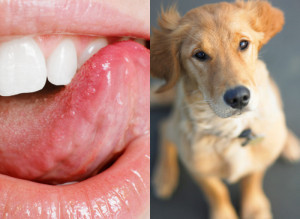
I know we have all heard the statement, “A dog’s mouth is cleaner than a human’s”. I know I’ve heard it, because I’ve said it before! Never knew the facts, but I know that I don’t mind letting dogs lick all over me, so I guess I just hoped it was true! LOL Find out the real answer after the jump!
[HuffPost] – Have you ever been told, “A dog’s mouth in nine times cleaner than a human’s”? It’s a common statement or wives’ tale that gets thrown around every now and then, mostly by one of the many dog lovers in their attempts to comfort friends that don’t enjoy having their faces licked.
According to the 2009/2010 National Pet Owners Survey, 62 percent of all U.S. households own a pet. That is about 71.4 million homes just in America alone. The majority of these pets are dogs, closely followed by cats. These pets are often more than just animals but considered more as a member of the family.
But is this cleanliness statement one of fiction or fact? Well, let’s think about this objectively. Most humans brush and floss their teeth two to three times daily, and don’t eat out of the trash or drink out of the germ-covered toilet. Can we say the same for dogs? It really depends on their owners.
The logic is simple: the healthier the dog, the cleaner the mouth. For you dog owners out there, there are many things you can and should do for the health of your dog. Dogs need our help to be healthy. They can’t brush their teeth on their own, or drive themselves to the vet.
Did you know that gum disease is the most diagnosed problem in dogs and cats? This nearly always leads to tooth loss. Once this happens, it may become difficult for your pet to eat and this may result in a deterioration of his health. This is because gum disease (gingivitis or periodontitis), like in humans, if left untreated can cause tooth rot and decay. This means that your pet can actually start losing teeth, making it very difficult or painful to eat anything. And unlike humans, dogs don’t have dentists that can do root canals, fill cavities or put crowns on their teeth. If these procedures are possible and you are lucky enough to find a surgeon, these procedures would no doubt be very expensive and difficult for your dog to go through — especially if he is older.
A side effect of gum disease is foul smelling breath or “doggy breath.” It’s true that a dog’s breath depends on factors such as diet, but hygiene can really be the main culprit. Rather than just ignoring your dog’s bad breath, it would be better to treat it. After all, you would treat yourself if you had bad breath, right?
Before reaching four years old, 80 percent of all dogs and 70 percent of all cats will show signs of dental disease. And just as in humans, when oral bacteria has access to interior organs through open gums, more serious health problems such as heart, lung and kidney disease may follow — not to mention oral odor that is no fun to be on the receiving end of. That could cause some worry about the cleanliness of your dog’s mouth — so it’s best to avoid poor oral health altogether.
Keeping your four-legged friend healthy will ensure the cleanest mouth possible.
How do you keep your dog’s mouth (and the rest of him) healthy?
• A well-balanced, meat-based diet is important
• Take your dog to the vet regularly and keep up to date with vaccines
• Brush your dog’s teeth on a regular basis or use an oral rinse (available in pet stores and online).
• Maintain routine oral hygiene visits to the vet or groomers
• Give him treats to chew on that will help remove plaque from his teeth
• Regular exercise or some type of physical activity would be beneficial, just as it is for humans, but of course this varies by breed and dog.
• If his breath is very bad, consider using an oral solution made for dogs and cats that help with bad breath
While good pet care is vital, the bottom line is that it’s a myth: generally speaking, a dog’s mouth is not cleaner than a human’s. But this doesn’t mean that it’s a danger to have your dog lick you or that you should shy away from having the healthiest dog possible. Your dog is dependent on you and you are ultimately responsible for his health and well-being.
Where did this myth come from? In an AbCNews.com article, veterinarian and author of Chicken Soup for the Dog Owner’s Soul , Marty Becker believes he knows. He believes that it comes from the practice of a dog licking its wounds. “And they’ll [dogs] be licking that wound and you’ll notice that the wound heals very fast… what that tongue does is it gets rid of the dead tissue”. It’s similar to when we have surgery and the wounds are cleaned out.
So the next time Spot wants to show his affection, you can fully enjoy the love without worrying about the germs. And do your best to keep his mouth healthy, so he can be around for many years to come.












